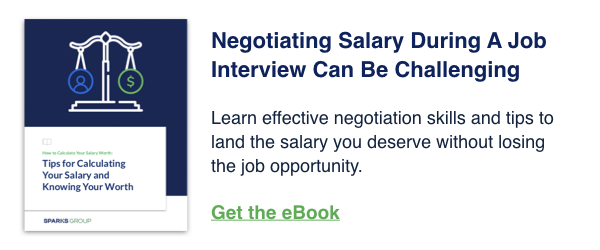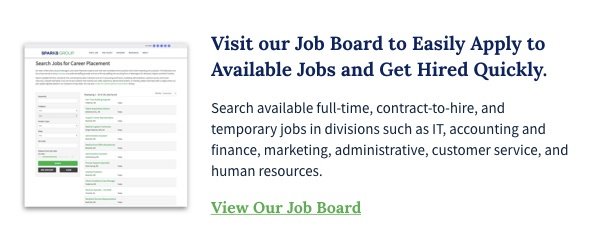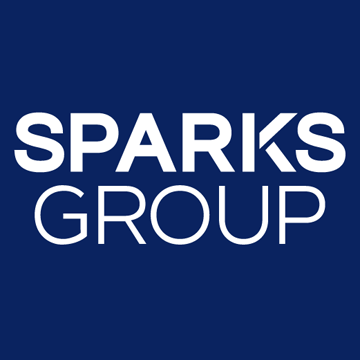-1.jpg?width=800&name=Webp.net-resizeimage%20(33)-1.jpg)
Interviewing for a new job can be incredibly stressful, especially when anticipating challenging questions. Being properly prepared for tough questions can help you maintain your confidence throughout the interview process.
There are several steps to take to set yourself up for a successful job interview:
- First, research the organization to help you to understand the company and their priorities, traditions, and strategies.
- Next, thoroughly review the job description and compare the requirements to your own qualifications to help you identify strengths and weaknesses with regards to the position.
- Lastly, make yourself familiar with common job interview questions that may be asked, and to prepare responses in advance, which can help you control any pre-interview jitters.
8 Common Tough Interview Questions and How You Should Respond
1. Why are you leaving your current job?
In this case, it is important to stay positive and never badmouth your current employer. The best answers are related to personal growth, more challenging work, career advancement, or the opportunity to use skills or education that is not available in the current position.
- I am interested in a job with more responsibilities and am ready for a new challenge.
- I am looking for the opportunity to advance my career and apply the skills/knowledge/experience I’ve gained in my current job in a new environment.
2. What is your greatest weakness?
Don’t take a strength and present it as a weakness. This is not only a facile and deceptive response, but it misses the point of the question which is to see if you understand your own weaknesses and that you are working to overcome them.
- I had a fear of public speaking in college, but after completing training and learning from on-the-job presentations and am much more confident today.
- I had difficulty with planning and prioritization, but began bullet journaling and using a productivity app to become much better at it.
3. Why is there a gap in your resume?
Be as honest as possible, but again, emphasize the positives where you can. Describe the reason for a gap, but point out how the time between jobs was spent productively.
- I took time off to care for a family member / had a period of unemployment following a layoff, but used that time to gain skills, complete training, or refocus on my future career.
4. Tell me about yourself / Why should we hire you?
If you are ready for it, these open-ended questions give you an excellent opportunity to sell yourself as the ideal candidate. Steer the conversation to your experience, strengths, and fitness for the job as related to the job description.
- I’ve been a team leader for the past six years and am interested in applying my MBA at the managerial level. I excel at improving collaboration, project management, and driving profitability and measurable results.
5. Where do you see yourself in five years?
This type of question is used to gauge your long-term interest in the job you are interviewing for and to determine if you have realistic expectations for what the position can provide you. When answering this question, detail how your skill development and career trajectory goals align well with the opportunities advertised in the job description to demonstrate your ambition to further immerse yourself in your field and become more skilled as you continue working. Bonus points for doing research and describing what projects you will likely complete in that role over the next few years.
- In the next five years, I hope to hone my skills to become a more effective team member that will eventually develop and lead new projects, represent the company externally to clients or customers, and be seen as someone with deep expertise in my sector. I’m excited with the opportunity to take on more leadership responsibilities as part of this role and hope to build on that experience to one day move into a more managerial role.
6. What is your greatest accomplishment?
Employers ask this question to allow candidates to expand on what they have listed on their resume and to describe how you may have noticed a problem and designed a solution to overcome it using your resourcefulness and skills. Make sure to use numbers when possible to give a tangible and concrete representation of your achievement’s outcome.
- In my last role I was tasked with handling our marketing campaigns. I noticed that we were spending too much resources on outreach to too broad of an audience, so I decided to move a quarter of the budget to a more targeted audience group, which resulted in a 30% click-through rate (CTR) increase. From there, I advised my team to develop messaging specific to subgroups within that audience, which resulted in an additional 10% CTR increase and 20% greater marketing ROI.
7. How would you spend a $1 million marketing budget? How would you measure ROI
While this may not be the exact question that is asked, this type of question is known as a “case study” question. The interviewer gives you a hypothetical situation, in which you can use your experience and skills to drive an outcome.
- As most companies have found, segmentation and personalization in marketing drives sales, revenue, and customer engagement. I would invest my marketing budget in data analytics that could then be applied to segmentation, automation, and personalization. Measuring ROI with an increase in customer acquisition, sales, revenue, and retention.
8. How do you stay focused while working remotely?
This question applies to positions where the employee would be working from home instead of an office environment. Interviewers are asking this to determine if the candidate can stay productive and get necessary work done while they work remotely without anyone else to keep them on schedule.
- I start the day working remote by breaking my morning and afternoon into tasks and prioritizing more intensive tasks earlier in the day to prevent burning out later in the day. I use a document to keep track of my tasks for the day, organized by due date, and cross them off as I finish to stay on track. I also make sure that I move any distractions, including pets and my cell phone, before starting my day and I set up in my office to simulate an office work environment.
Related Reading: Behavioral Interview Questions: How to Ace Them
Preparation for difficult interview questions cannot only help you to manage a stressful situation, but it can ensure that you present yourself as the ideal candidate for an open position. Knowing how to present yourself while answering these common questions can also help you navigate a difficult phone interview.
Another way to better prepare for interviews is to work with a staffing and recruiting firm. Recruiters have great insights and, often times, long-term relationships with companies and can provide interviewees helpful tips and questions to prepare for. By working with a recruiting firm, like Sparks Group, candidates can easily gain a competitive edge in the job market.
Sparks Group brings nearly a half-century of recruiting and temporary staffing experience to the industry, placing candidates in challenging and rewarding positions. Our staffing agency's primary focus is to align job opportunities that match each candidate’s skill-sets, experience levels, career objectives, and growth needs.
To begin your next step towards your career goals, check out our Job Board to find new opportunities and reach out to our recruiting experts.








